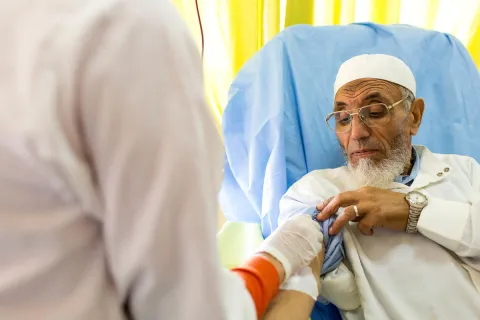The Cancer & Ageing Tipping Point: A Need to Improve Outcomes

Globally, 60% of people who have cancer are 65 years old or older and their number is expected to double over the next two decades. And for the ageing population diagnosed with common cancers such as prostate, lung and breast cancer, a recurrence occurs more commonly than for younger adults.
Ageing looks considerably different today than in decades past. Not surprisingly, a recent report by the Economist Intelligence Unit noted that ageing people actively contribute to their families, societies and communities – as employees, consumers, caregivers and more. An increased risk of a cancer diagnosis with age certainly has many implications beyond impacting such important contributions. The onus is on us as innovators in science, healthcare and oncology to ensure older people with cancer have access to the best quality of care available. This will require a sharpened focus on more tolerable and tailored treatments, and collaboration across the system to provide supportive and effective care.
Throughout the course of cancer – from pre-diagnosis to post-treatment and survivorship – older patients face multiple barriers to optimal care that must be addressed to ensure the best possible outcomes. Systems must be in place prior to diagnosis – including greater clarity around and standardisation of screening guidelines for older patients and appropriate treatment options that include more effective and tolerable alternatives for those who may not be able to receive more intensive treatments.
Improved screening and treatment must be informed by more inclusive clinical trials that reflect the needs of an ageing population. As a paediatric oncologist, I have devoted my career to improving outcomes for children with cancer, in part through clinical research. Now, as I gain further insight into the other side of life’s continuum, I do not subscribe to the idea that older patients should not be enrolled in clinical trials. To the contrary, we must design clinical trials to better meet their needs, planning accordingly to account for potential health issues they face. Simply put, it is our responsibility to promote inclusion. We need the data generated from clinical trials to empower more customised clinical decision-making and create more inclusive screening and treatment guidelines.
Thinking about cancer care also means looking beyond therapeutics to provide appropriate support for older patients. Going through cancer treatment can be unimaginably challenging, both physically and mentally. While carers play an essential role in the patient journey, older patients with cancer may also need additional support networks as they may face a variety of complex health needs. They require integrated support from a multidisciplinary team of geriatric and oncology specialists. Too often, these cross-functional services are not well integrated, may fall short or are even absent. Furthermore, older patients and their carers need better access to post-treatment support and psychosocial care to promote mental health as part of their full quality of life.
New approaches are needed to build a health system equipped to better address the diverse needs of older patients with cancer. There are many pieces to this puzzle, and success will not be unidimensional. When Sanofi launched When Cancer Grows OldTM on World Cancer Day, February 2020, we recognised the need for collaboration and set out to support our partners working across the global cancer community of advocates and healthcare providers to explore ways we can work together to drive systemic change for older patients across the continuum of care. We know that identifying the problem is only the first step, and we are committed to uniting efforts that will create meaningful progress and tangible solutions.
As we consider how to improve health outcomes, the COVID-19 pandemic reminds us of the importance of comprehensive approaches. There is a clear need to develop more effective solutions to help ensure that as patients grow older, their continuum of care allows them to not only live longer but to have a better quality of life and continue contributing to our families and societies.
At a UICC’s Special Focus Dialogue, four expert speakers explored the practical and ethical dilemmas of caring for older cancer patients during COVID-19, addressing the issue from different perspectives.
I am fortunate that my father, now 96 years old, is a cancer survivor, and that I am able to still ‘occasionally’ help him troubleshoot his MacBook Pro as he navigates the web. More importantly, I am thankful that I still can receive his wisdom, humour, and love. The ageing population deserves the best that today’s scientific advances in cancer care can offer. We all must do our part to build a system that can respond to changing needs, and we must hold ourselves accountable to achieving that vision. By reimagining how we utilise our collective expertise, I believe we can make critical strides toward ensuring every person with cancer, no matter their age, receives the best possible care, has the opportunity to grow old, and can remain pillars in our lives.
Last update
Thursday 17 November 2022Share this page






